
Preamble to Michael Fleischer's run...
Thanks to Peter Sanderson's well researched introduction to 1988's
Wrath of The Spectre which collected all of Michael Fleischer's penned Spectre tales (including three which never saw print during his original 1974
Adventure Comics run) we have quite a bit of insight into how these stories came about which I'll share here.
In 1974, Joe Orlando was sitting at the helm of
Adventure Comics and considered his own experience with horror comics when selecting a lead feature for the title.
"Since I had a liking for horror, and I knew I had to include superheroes in Adventure Comics, I looked for a character who would have a duality, that would be a superhero and also have a horrific aspect."
A disappointingly straight forward explanation perhaps, for those who have heard that Orlando hit upon the idea of reviving The Spectre after being mugged and wanted an outlet through he could express his rage. Sanderson debunks this impetus though did confirm that the mugging took place though Orlando couldn't recall if it preceded or followed the start of The Spectre's
Adventure run. "I might have used that to justify why I was doing that" is about the closest connection there likely was between the two events. It's unlikely that Orlando had The Spectre in mind for his "character who would have a duality" since Michael Fleischer would later recall that when the two first spoke about the coming project, "he wasn't familiar with the character", but given the editor's preference for tough guy heroes - "As a kid, I liked the Superman who took the criminal up really high and said 'Listen, buster, you tell me what's going to happen or I'm going to drop you.' That's why I read Superman. I didn't like him when people turned him into a wimp."
Michael Fleischer's first comic book work can be found in
Sinister House of Secret Love #4 where he received credit for helping out with dialogue for a Mary DeZuniga written tale. He continued to work for Orlando thereafter (with a co-writing credit for that title's next issue on the story "
Death at Castle Dunbar") on a variety of his titles. Now, Fleischer had also written, or was the process of writing, a number of Encyclopedia's covering the history of various DC characters. While three were published (for Superman, Batman, and Wonder Woman) he had intended to continue the series before the assignment was dropped. I don't know if The Spectre was next on his list, but Fleischer was getting to it.
"The first Spectre story I ever read appeared in Jules Feiffer's book
The Great Comic Book Heroes (
All-Star Comics #1) and I thought it was a very nice story."
As for the rest of the Golden Age, "I liked especially the early ones that were very scary and horrific, and I disliked the later ones that were comical a lot. I thought The Spectre could be a really exciting character, but that the real spirit of the character, no pun intended, had been exemplified by those very early stories. I cut my teeth in comics writing horror stories; I like horror stories. The early Spectre stories were much more in keeping with my own sensibility".
Fleischer then suggested The Spectre as Orlando's lead feature, supplied him with his notes on the character culled from his never completed encyclopedia, and got the editor's approval.
Orlando selected Jim Aparo for art duties which seemed natural given the fact that the artist had been working on The Phantom Stranger ("The Spectre's "weak sister" according to the editor) for him at the time along with other projects -
House of Mystery #201's Aparo drawn "
The Demon Within" had won a Shazam award and still stood out in Orlando's mind as a significant achievement when Sanderson's interviews were conducted. "Jim and I had worked together, we worked fine, and I love his artwork and I like his personality."
There's one other creator involved with these tales whose name you'll find on most of these stories and that's Russell Carley who is credited for 'Script/Art Continuity'. What does that mean? Fleischer explained that, "When I first started writing comics, my friend Russell Carley, who's a fine artist, and I used to work on them together. We would get together on a Saturday afternoon and we plotted the story together. Then Russell would take the plot and break it down to panels, and I would write the script. I had never written any kind of script in my life. We wanted to come up with some kind of title that expressed what he did as opposed to what I did. There was really no name in comics for what he did. All we succeeded in doing was confusing everybody. A lot of ideas for The Spectre, like the giant scissors cutting a man in half, were Russell's ideas. We had a lot of fun, but then he lost interest. I think we only did this for about a year. He wasn't really interested in comics."
Carley's credits will continue up through
Adventure Comics #437 and can also be found in one or two of Fleischer's Jonah Hex tales along with sole acknowledgement for the script of a Black Orchid tale in
The Phantom Stranger comic. He did a little more than that, but I think this gives some sense of the brevity of his comic book output. Would be interested in finding an interview or anything more really about the fellow.
Adventure Comics #431 (Feb. 1974)
"The Wrath of... The Spectre"
 Synopsis
Synopsis: Four security officers watching over an armored truck are mercilessly machine gunned down by a team of bandits. Their leader is a man named Fritz whose callous streak of inhuman indifference explains the effortless manner in which he pulled the trigger on these surrendering men. His ruthlessness extends to gunning down one of his own men when he's been winged by an officer arriving at the scene so that he "won't tell the cops nothin'".
The gang member does however, tell the cops something when Lt. Jim Corrigan enters the scene and retrieves a business card for an antique shop from his corpse.
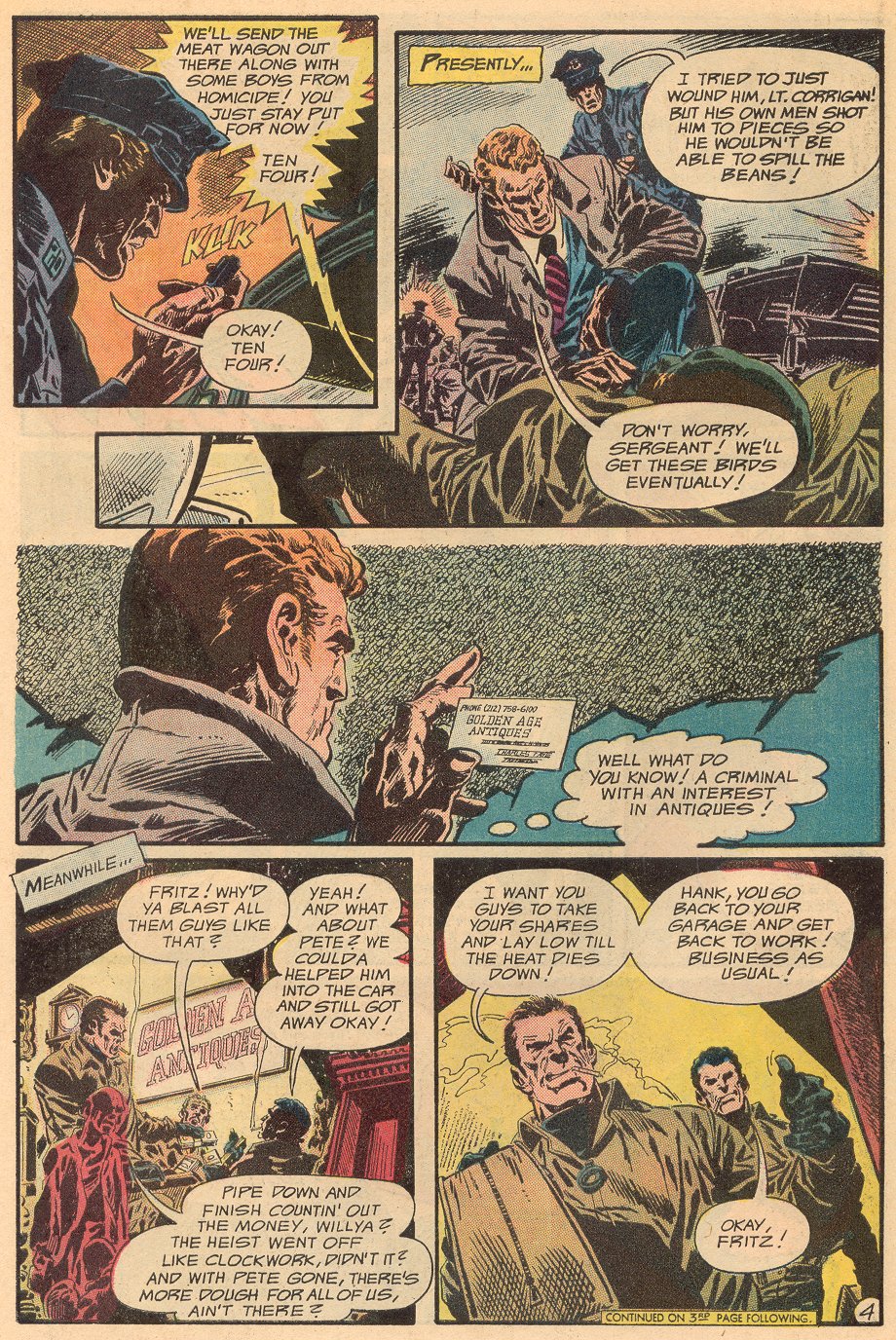
Meanwhile, Fritz is preparing to lay low in South America, while he orders his men to act "like nuthin' ever happened". For Charlie, that means returning to his antique store where Jim Corrigan waits.
Charlie: Can I help you, Sir?
Corrigan: You sure can, Fella! Just tell me who helped you pull that armored car heist earlier and I'll see to it that all of you get a crack at the Police Athletic League's Citizen of the Year award.
Stalling for time, Charlie stammers out his compliance even as his hand reaches for a gun concealed in a drawer below eye level. Unloading the weapon at point blank range, Corrigan merely stands before Charlie coolly thanking him for his assistance and suggesting that they'll be seeing one another again soon as he disappears.
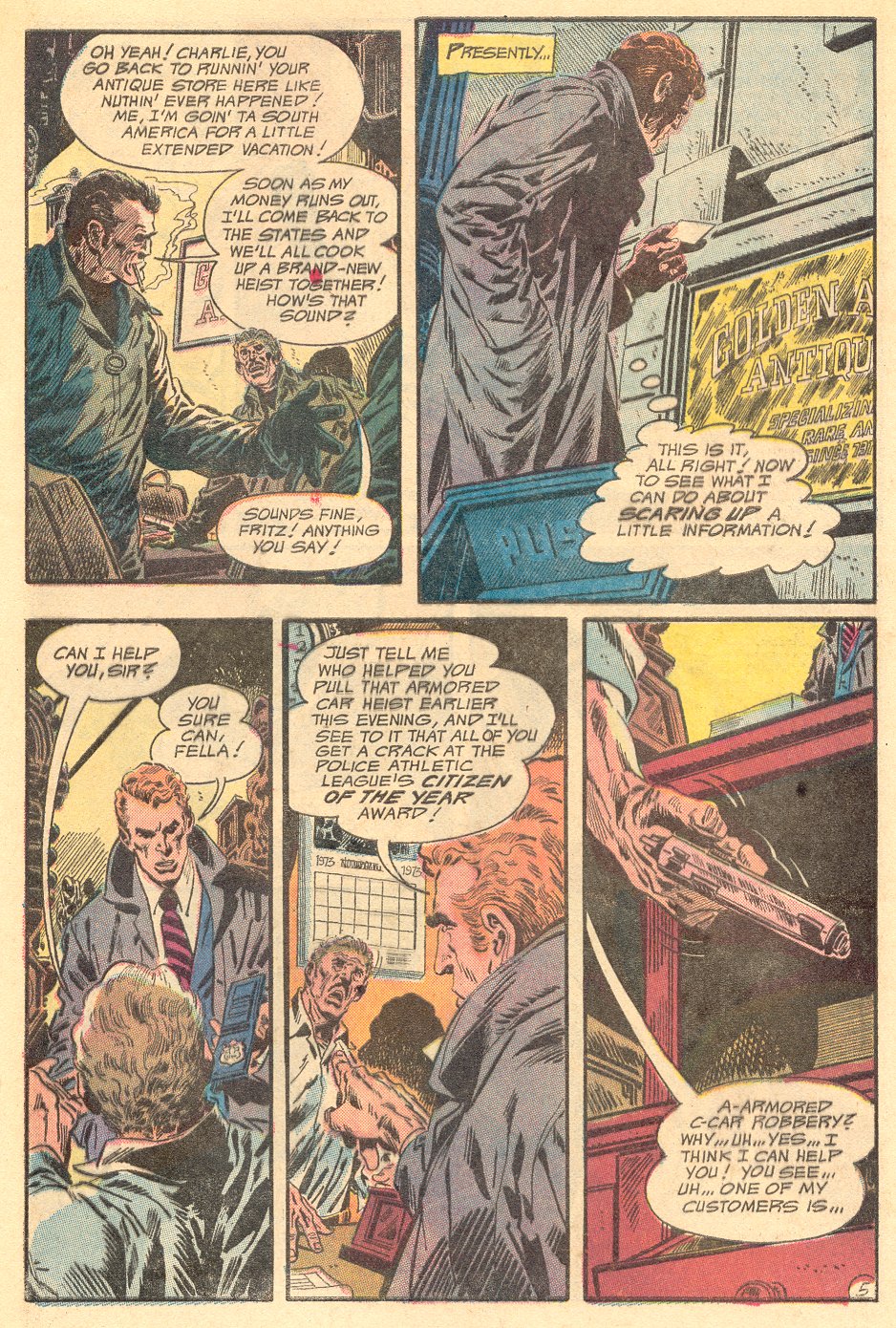
Freaked out, Charlie calls another member of the gang from a phone booth, relays what's happened, and announces his intention to get out of town. Floating overhead, The Spectre merely observes even as Hank on the other end, humours his partner. Immediately thereafter, Charlie races down a darkened road only to encounter the looming figure of The Spectre grown to enormous size obstructing the path ahead. The scofflaw swerves to avoid the frightening figure and drives off a cliff. It is while reading about these events in the next day's paper that a frightened Hank receives a visit from The Spectre.
"You have good reason to be afraid, Hank!"
Startled, the criminal turns and aims a machine gun at his unwelcome visitor. Bad idea.
Spectre: You can't kill me, Hank! You see, I am already dead!
Hank: What are you doing here? Wh-What do you want?
Spectre: I want to sleep forever in a nice warm grave, Hank! I want the everlasting peace that is rightfully mine -- but the stench of evil men like you will not let me rest!
And with that, Hank's machine gun begins to melt... as does his hands... as does the rest of him until a putrid puddle of flesh is all that remains.


Only one name remains unpunched on The Spectre's dance card.
Overhead, Fritz smokes a pipe while congratulating himself on pulling off such a successful job. His first inkling that something isn't right comes when far too much smoke emanates from his pipe and from that smoke rises The Spectre.
"I have come for you, villain... because so long as you remain free, the souls of your victims must writhe in torment! Stare deep into my eyes, evil one -- and we will walk into the valley of death... together!"
Grabbing a nearby stewardess for a hostage, Fritz looks like a deranged madman to his fellow passengers who can neither see nor hear The Spectre. Nevertheless, the grim ghost draws closer.
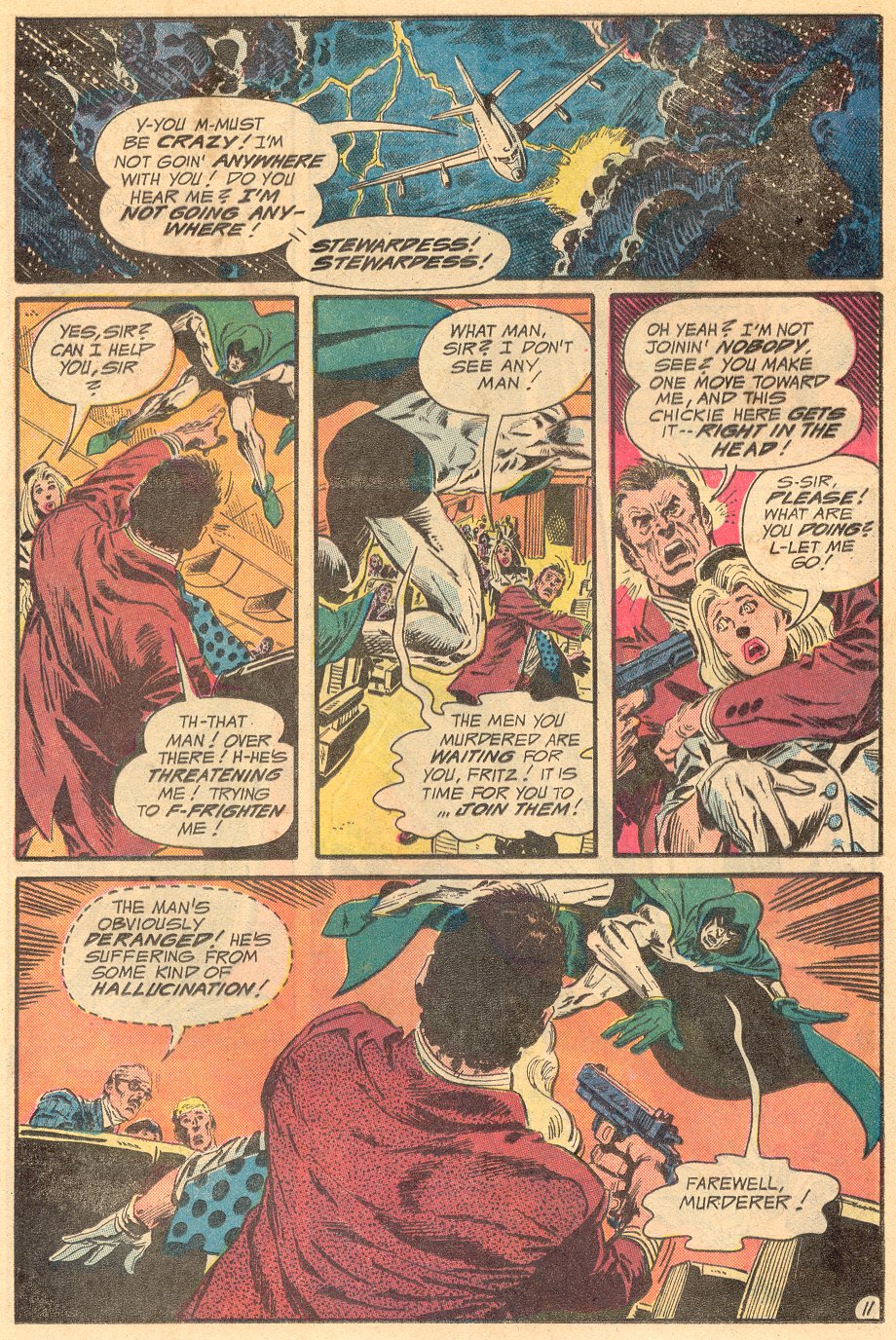
"Farewell, murderer!"
The lights go out only for power to be restored almost instantly. With the skin stripped from his bones, only the skeleton of Fritz remains aboard the plane to the horrified gasps and screams of the remaining passengers. Elsewhere, Corrigan is chided by his Chief for not yet having a lead on the criminals already dealt with by his other half.
"Don't worry, Chief -- we've got the entire city sealed off! Those mugs don't have a
ghost of a chance!"
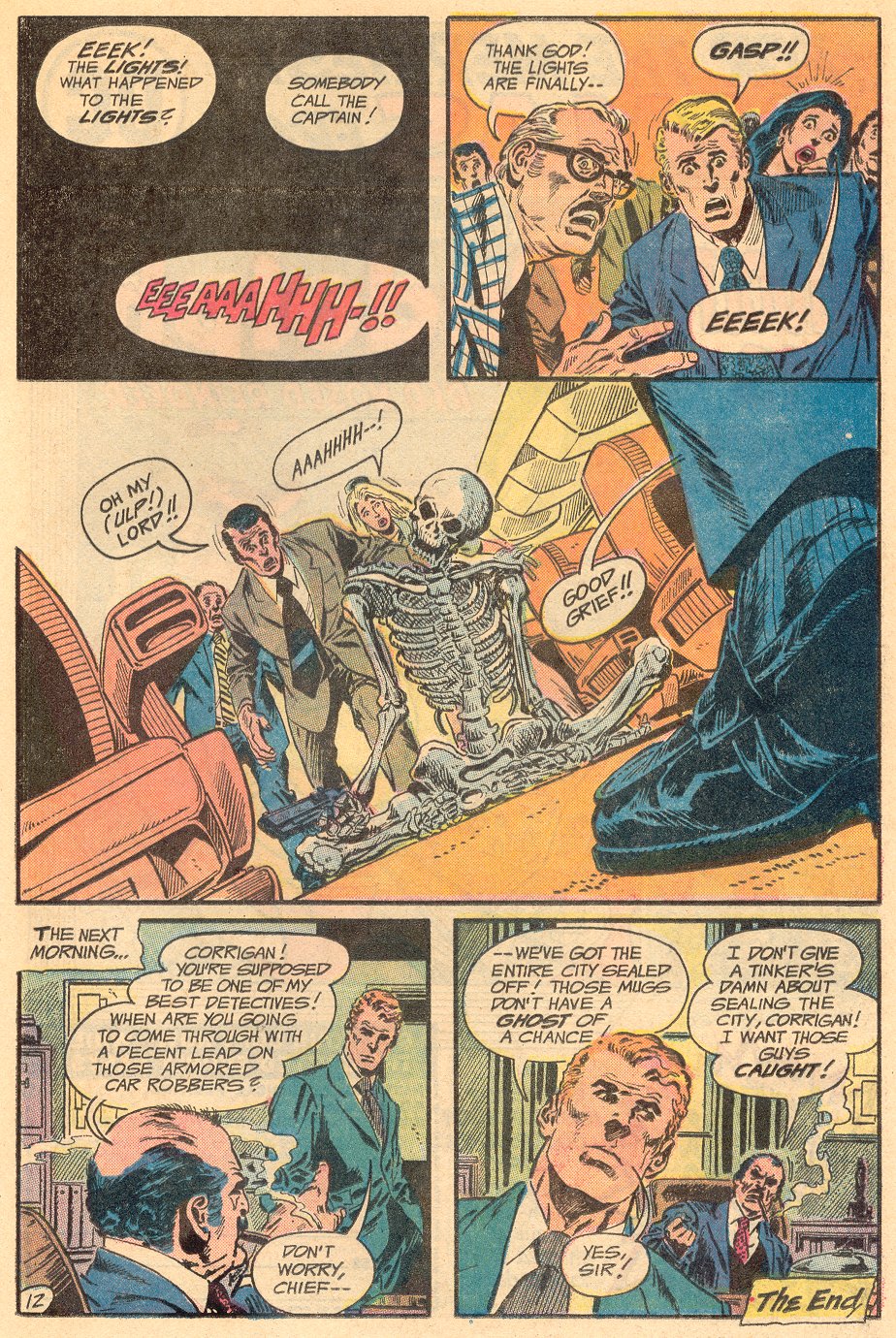
And with this pun, Fleischer's first Spectre tale comes to a close.
Thoughts: 'Golden Age Antiques' - Charlie's curiosity shop - has a '212' area code which would place his store in New York - more precisely, if things haven't changed since 1974, in Long Island, New York. I guess we're out of Gateway City now.
Corrigan is also now a 'Lieutenant-Detective' and not Captain of Detectives but I suspect that these tales will be taking place within their own little continuity and for that reason, I won't be nitpicking little details such as these within these reviews. As we'll eventually see, Corrigan will be given a birth year of 1940 and Clark Kent will be referenced as if Superman's secret identity is common knowledge so I think it's fair to say that Fleischer's Spectre has his world all to himself.
However...
In a response to a letter published in
Adventure Comics #435 requesting that "a thin thread of continuity" connect the varying component of The Spectre's history, the following is written:
"After long and careful thought, we've come up with an explanation for all The Spectre variations: we are now writing about the Earth-One Spectre, not the Earth-Two Spectre who you're more familiar with."
Though this solution might work for the most part, I'm not sure how much stock I'd put into it. I'm not even sure if Fleischer would have given any consideration to this idea (why treat Superman as if he's a fictional character in a later story, for instance) and I certainly don't recall The Spectre being treated as having a doppelganger in any stories hereafter (I mean, wouldn't two Spectres have come in handy during
Crisis, for instance?). But hey, as a solution, it works for the time being, I suppose.
Anyway...
At last, the original Spectre introduced way back in 1940 makes his return. It's hard to determine when exactly The Spectre stopped being The Spectre, but certainly, that hard edge present in his debut was already softened by the end of his first year resulting in that fact that come Feb. 1941, his replacement could be heard uttering such quaint mantras as "let the law deal with him" and "you're not going to cheat the law!" That "thin thread of continuity" could, in my opinion, be securely tied to the tail end of 1940 without an errant strand being detected along its 33-year length.
Not to say that the prose doesn't get a little too flowery here and there - "I want to sleep in a nice, warm grave" is a little over the top for my tastes and Corrigan's "ghost of a chance" pun is downright goofy - but the essence of The Spectre has been restored. I kind of feel bad for any fans who wanted to pick up where the character left off in 1969/70 and I certainly wouldn't have minded finding out myself what sort of verdict The Voice passed down to him, but that ship seems to have sailed before it barely cleared the docks.
Because Fleischer has Fritiz' men express their qualms about killing the guards with a "why'd ya havta gun 'em down like that? They was surrenderin'!!", it seems fair to say that these thugs still possess some amount of humanity in their souls which doesn't go undetected by The Spectre. That the first member of the gang gets off with the privilege of being interrogated by Corrigan and offered a prison sentence and not punished with a visit from The Spectre quite this early suggests a sort of arrangement between the pair where until that humanity has been fully erased - say by firing a gun at Jim Corrigan - The Spectre is content to let his lieutenant-detective half deal with things the way he sees fit even if it means Charlie could potentially have little more to worry about than prison athletics once he gets used to jail. I mean, this is a Spectre who can once again read minds which, I would think, make Corrigan surplus to requirements. Nice to see that a suitable role has been provided for the detective as a potentially merciful judge and jury who has the choice of handing things over to the merciless executioner that is The Spectre.
With that said, I can't help but feel that the most vile of the men - Fritz - was the one who got away with the most lenient sentence. Between driving off a cliff, watching as I'm slowly transformed into melting flesh, or simply changing into a skeleton, it seems like Door #3 would be the most appealing finish of those choices. Still, "walk[ing] into the valley of death" with The Spectre certainly doesn't sound like much fun either. Brrrr!
And some beautiful work by Jim Aparo. His realistic style really makes the horror seem all that more believable - both in the way it's delivered by The Spectre and reflected within the eyes of his victims.
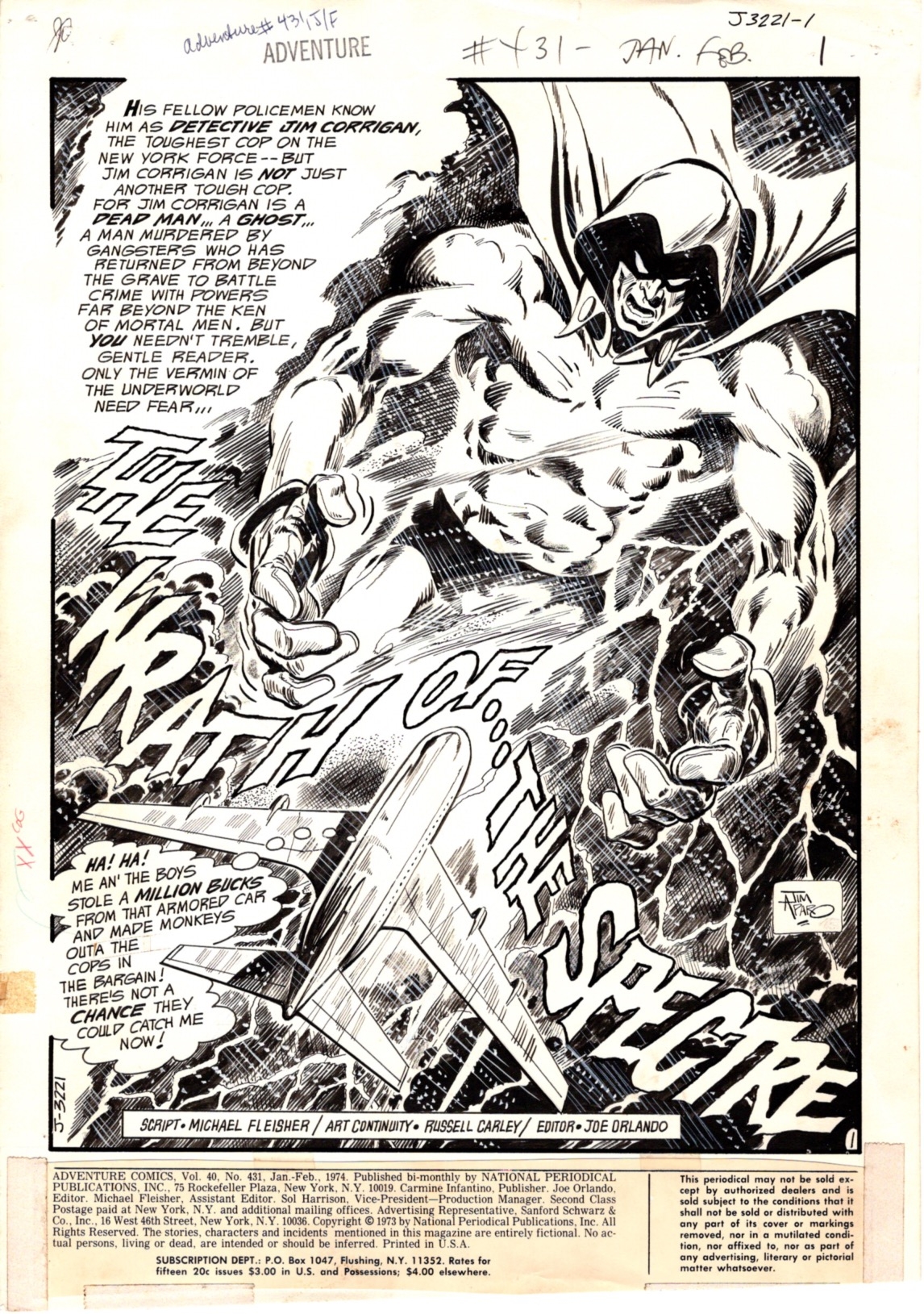
Not much more to say, but 'Welcome back, Spectre!'